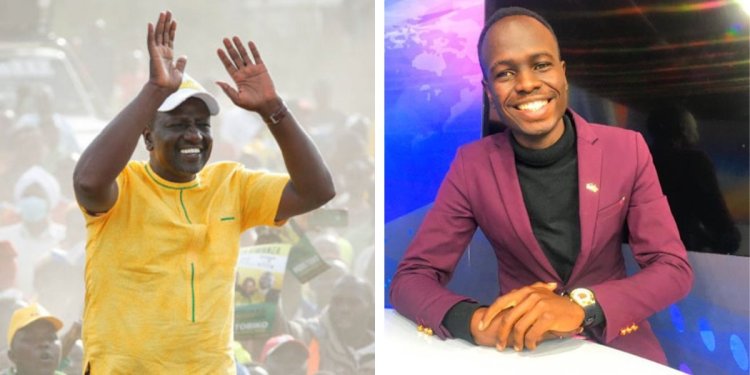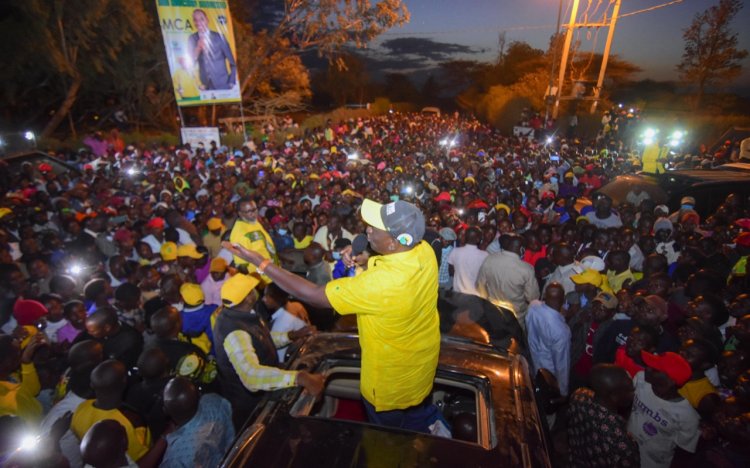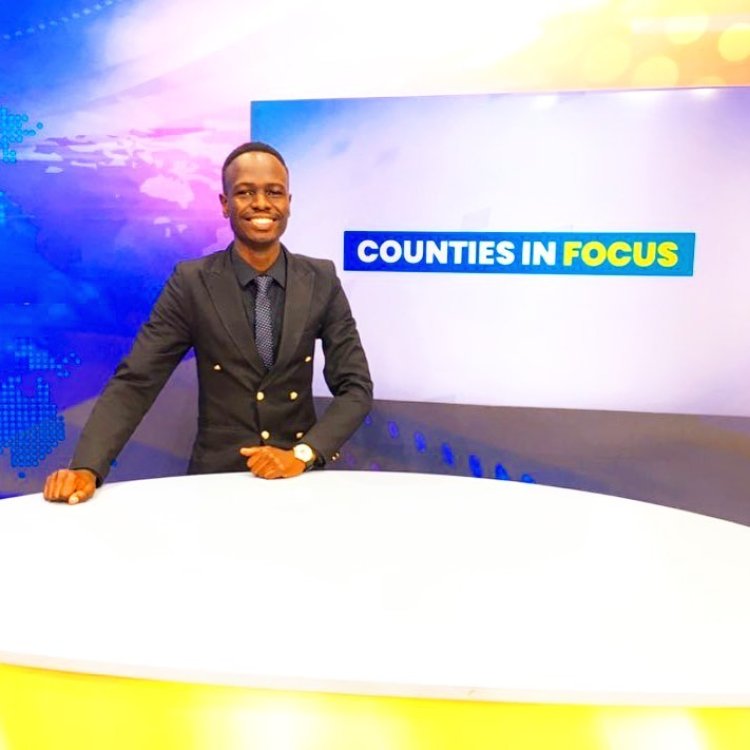Meet Journalist Who Made Ksh2 Million From Ruto's Campaigns
Wabwire has over 132,500 followers on Twitter, a matter which helped him drum up support online for the UDA presidential candidate ahead of the August 9 elections.

Edgar Wabwire, a journalist and digital influencer, has disclosed that he was paid Ksh2 million by President William Ruto's United Democratic Alliance (UDA) in the run-up to the August 9 general elections.
Speaking in an interview with Malenga wa Burudani on Thursday, December 22, Wabwire noted that the millions he made during the campaign period were the most he has ever made as an influencer.
Wabwire has over 132,500 followers on Twitter, a matter which helped him drum up support online for the UDA presidential candidate ahead of the elections.
"When I reveal the time I made the most amount of money through Twitter, it is during the campaign period. There was a time I was paid a cheque of Ksh2 million," he disclosed.

President William Ruto speaking at Limoro market, Tigania West, Meru County on July 3, 2022. /TWITTER
When pressed for comment regarding the influencing space on social media platforms such as Twitter, Facebook and Instagram and how they have generated revenue for influencers, he recounted his experience as a university student where he was contracted to generate awareness for an event in Nairobi.
This is after he amassed what was then considered a huge following on Instagram to the point that it also increased his popularity status.
"When I was in university, there was a time I used to like Instagram and at a time it was popular, I grew my following to 20,000. At that time, I was in my third year and I was becoming a model.
"There was an event at Panari and I thought that these guys didn't need marketing so I sat down with some of my friends and told them that there is an untapped opportunity so I suggested that we draft to them a proposal for social media marketing and they wondered if they will accept us because we're not from the TV or radio stations," he added.
His friends were slightly hesitant as they feared they would be turned down as they are not attached to TV or radio stations, but Wabwire still managed to talk them into it and they drafted a proposal that they would pitch to the organisers.
"I told them that there's no harm in trying...that it is better to try and fail than not try at all. So we were able to draft a proposal, it was accepted and that was the first income I made as an influencer and it was around Ksh300,000," he added.
He revealed that the earnings used to go to shooting the video because the team had to go there to shoot as well as pass the footage through editing among other things. They had drafted the proposal to indicate Ksh300,000 and were paid that amount.
"At that time I had a team so we divided the amount and then I posted the final video on my Instagram page and I thought that someone can make money from the Internet. From that time I decided that I would take the path that not many people are on and it is better to take it," he expressed.
Wabwire added that he decided to join Twitter as Instagram carried its own huge pressures given that it is mainly photo and video-centric, thus users are heavily judged for their looks on the platform. Twitter in his view is based heavily on one's opinion.
Once there, he posted his content on the social media platform as well as news that normally would not be covered by mainstream media houses, which increased his following.
In a previous interview with the Nation, Wabwire had revealed that at some point in 2020, he was bullied so much on Twitter that he went offline for a week and even contemplated deleting his account, but he developed a tough skin and filtered when to respond to people and when to ignore others.
He stated that for him, having a content calendar and understanding his audience have been part of his success. He also noted that while not everyone who follows you online is your friend, it is important to have a tight-knit community, especially the people who have walked with you all through the journey.
“To become an influencer, the first and most important thing you need is to carve out a niche. Everyone wants to do comedy or entertainment, and while it is easy to create publicity with that genre if you have good content, you need to understand what works for you. With time, your content has to evolve and be relatable.

Edgar Wabwire inside a newsroom. /INSTAGRAM.EDGAR WABWIRE
“Then, you have to put in the work. What most people see is the number of followers and the posts, but creating content takes careful consideration and time. You have to be disciplined and good at time management and have a proper understanding of your audience. For instance, get to know what time of day your post gets the most engagement," he stated then.
Wabwire is a strategic communication expert whose main area of expertise is in media relations, content development, crisis communication, digital reputation management and optimization, sales and marketing. He has a proven track record in planning and executing various communication strategies, brand visibility and awareness.
He also has an active practice in developing and implementing business operations gained from working in media, online and offline market industries as well as proven expertise in managing internal, external, and digital communication. He is skilled in writing, producing, reporting, hosting, editing news, videography, photography, media relations, website management and the use of Adobe creative software
During his Jamhuri Day speech on Monday, December 12, President Ruto expressed the need to make the benefits of monetisation of online activity available to Kenyan content creators on more platforms, adding that he had spoken directly to Meta, the parent company of Facebook, Whatsapp and Instagram, to monetise content for Kenya's digital entrepreneurs that will exponentially multiply incomes and create employment opportunities for others.
He gave an example of how much money he would have made off his Facebook page with over 2.3 million followers if he was not a State Officer.

 admin
admin 




